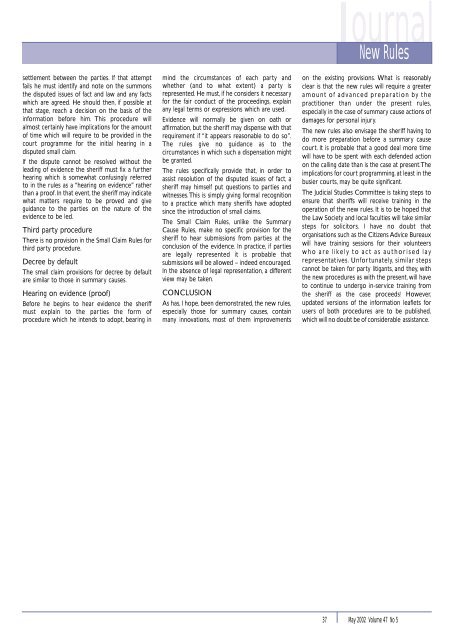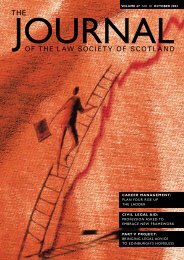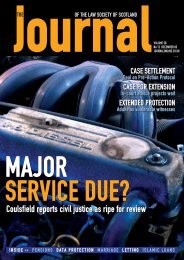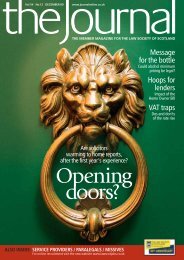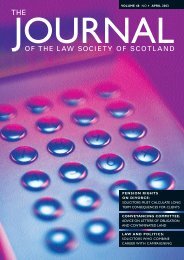OF THE LAW SOCIETY OF SCOTLAND - The Journal Online
OF THE LAW SOCIETY OF SCOTLAND - The Journal Online
OF THE LAW SOCIETY OF SCOTLAND - The Journal Online
Create successful ePaper yourself
Turn your PDF publications into a flip-book with our unique Google optimized e-Paper software.
settlement between the parties. If that attempt<br />
fails he must identify and note on the summons<br />
the disputed issues of fact and law and any facts<br />
which are agreed. He should then, if possible at<br />
that stage, reach a decision on the basis of the<br />
information before him. This procedure will<br />
almost certainly have implications for the amount<br />
of time which will require to be provided in the<br />
court programme for the initial hearing in a<br />
disputed small claim.<br />
If the dispute cannot be resolved without the<br />
leading of evidence the sheriff must fix a further<br />
hearing which is somewhat confusingly referred<br />
to in the rules as a “hearing on evidence” rather<br />
than a proof. In that event, the sheriff may indicate<br />
what matters require to be proved and give<br />
guidance to the parties on the nature of the<br />
evidence to be led.<br />
Third party procedure<br />
<strong>The</strong>re is no provision in the Small Claim Rules for<br />
third party procedure.<br />
Decree by default<br />
<strong>The</strong> small claim provisions for decree by default<br />
are similar to those in summary causes.<br />
Hearing on evidence (proof)<br />
Before he begins to hear evidence the sheriff<br />
must explain to the parties the form of<br />
procedure which he intends to adopt, bearing in<br />
mind the circumstances of each party and<br />
whether (and to what extent) a party is<br />
represented. He must, if he considers it necessary<br />
for the fair conduct of the proceedings, explain<br />
any legal terms or expressions which are used.<br />
Evidence will normally be given on oath or<br />
affirmation, but the sheriff may dispense with that<br />
requirement if “it appears reasonable to do so”.<br />
<strong>The</strong> rules give no guidance as to the<br />
circumstances in which such a dispensation might<br />
be granted.<br />
<strong>The</strong> rules specifically provide that, in order to<br />
assist resolution of the disputed issues of fact, a<br />
sheriff may himself put questions to parties and<br />
witnesses.This is simply giving formal recognition<br />
to a practice which many sheriffs have adopted<br />
since the introduction of small claims.<br />
<strong>The</strong> Small Claim Rules, unlike the Summary<br />
Cause Rules, make no specific provision for the<br />
sheriff to hear submissions from parties at the<br />
conclusion of the evidence. In practice, if parties<br />
are legally represented it is probable that<br />
submissions will be allowed – indeed encouraged.<br />
In the absence of legal representation, a different<br />
view may be taken.<br />
CONCLUSION<br />
As has, I hope, been demonstrated, the new rules,<br />
especially those for summary causes, contain<br />
many innovations, most of them improvements<br />
<strong>Journal</strong><br />
New Rules<br />
on the existing provisions. What is reasonably<br />
clear is that the new rules will require a greater<br />
amount of advanced preparation by the<br />
practitioner than under the present rules,<br />
especially in the case of summary cause actions of<br />
damages for personal injury.<br />
<strong>The</strong> new rules also envisage the sheriff having to<br />
do more preparation before a summary cause<br />
court. It is probable that a good deal more time<br />
will have to be spent with each defended action<br />
on the calling date than is the case at present.<strong>The</strong><br />
implications for court programming, at least in the<br />
busier courts, may be quite significant.<br />
<strong>The</strong> Judicial Studies Committee is taking steps to<br />
ensure that sheriffs will receive training in the<br />
operation of the new rules. It is to be hoped that<br />
the Law Society and local faculties will take similar<br />
steps for solicitors. I have no doubt that<br />
organisations such as the Citizens Advice Bureaux<br />
will have training sessions for their volunteers<br />
who are likely to act as authorised lay<br />
representatives. Unfortunately, similar steps<br />
cannot be taken for party litigants, and they, with<br />
the new procedures as with the present, will have<br />
to continue to undergo in-service training from<br />
the sheriff as the case proceeds! However,<br />
updated versions of the information leaflets for<br />
users of both procedures are to be published,<br />
which will no doubt be of considerable assistance.<br />
37 May 2002 Volume 47 No 5


